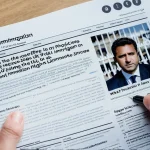Immediate Political and Diplomatic Changes Post-Brexit
Since Brexit, the Brexit political impact on UK-EU relations has been profound, reshaping diplomatic ties fundamentally. The UK’s withdrawal necessitated a complete redefinition of UK-EU diplomatic relations, moving from member-state coordination to maintaining sovereign negotiations and bilateral agreements.
Key milestones in Brexit negotiations included the Withdrawal Agreement, which addressed citizens’ rights, financial settlement, and border issues. After formal exit, the newly established UK-EU Trade and Cooperation Agreement set the framework for future collaboration. These agreements represent deliberate efforts to stabilize relations amid evolving political landscapes.
Additional reading : What’s the Impact of Recent Policies on UK Migration Patterns?
Diplomatic shifts also altered alliance dynamics. The UK sought to reinforce ties with non-EU partners while sustaining cooperation on security and policy with the EU. However, policy coordination is now more complex due to differing priorities and the UK’s independent global stance. Still, ongoing dialogue shows a mutual interest in balancing sovereignty with constructive engagement.
Through these negotiations, the UK and EU have had to navigate a delicate path, balancing separation with the necessity for collaboration—a testament to the enduring significance of their political and diplomatic relationship post-Brexit.
Additional reading : How Does Brexit Impact the Education System in the UK?
Economic Consequences for Trade, Investment, and Jobs
The Brexit economic effects have significantly reshaped UK-EU trade dynamics. Post-Brexit agreements altered market access, introducing customs checks and regulatory barriers that were previously absent within the single market. This led to increased costs and delays, affecting many sectors reliant on seamless supply chains.
Cross-border investment flows have also been impacted. Uncertainty following Brexit negotiations prompted some investors to delay or relocate projects, reflecting concerns about future access to EU markets and regulatory divergence. Businesses face new challenges adjusting to these changes, with shifts in operational strategies to navigate evolving trade environments.
On employment, the Brexit impact on jobs is visible through alterations in labor mobility and recruitment patterns. Restrictions on freedom of movement have reduced the availability of EU workers in the UK, influencing labour market trends notably in sectors like healthcare, agriculture, and hospitality. This has intensified recruitment difficulties, prompting some industries to seek alternative solutions such as increased automation or domestic workforce development.
Overall, the Brexit economic effects underscore the complexity of realigning trade, investment, and employment within the post-Brexit framework, demanding ongoing adaptation by businesses and policymakers alike.
Regulatory and Legal Changes Affecting Both Sides
Brexit introduced significant Brexit regulatory changes, marking a clear shift in the UK’s and EU’s legal frameworks. The immediate effect was the end of automatic application of EU law within the UK, leading to a divergence known as UK-EU law divergence. This divergence affects a spectrum of regulations from product standards to data protection.
Businesses now face challenges adapting to separate compliance regimes. For example, goods exported from the UK to the EU must meet EU conformity assessments, which differ from UK requirements, causing delays and extra costs. Similarly, financial regulations have diverged; the UK has developed its own rules, creating complexity for firms operating transnationally.
Customs procedures evolved as well, with new declarations and checks replacing the seamless internal market flow, increasing the administrative burden. Data protection also requires careful navigation due to differing standards; the UK’s decision to maintain adequacy agreements with the EU mitigates some issues but does not eliminate complexities.
In summary, Brexit compliance now demands heightened vigilance from companies, as regulatory and legal changes continue to reshape cross-border operations.
Social and Cultural Impact on Citizens and Mobility
Brexit’s social impact on UK-EU citizens is most evident in changes to freedom of movement. The end of unrestricted migration altered residency rights and visa requirements, complicating travel, work, and study between the UK and EU countries. For example, new visa rules require many UK citizens to secure work permits to live or work in the EU, affecting plans for long-term relocation.
Educational exchanges have been disrupted, with the termination of the UK’s participation in Erasmus causing reduced opportunities for student mobility and cultural interaction. This impacts thousands of young people who previously benefited from EU-supported programmes fostering academic and cultural exchange.
Additionally, UK and EU citizens face practical challenges such as residence permit renewals and access to healthcare or social services in their host countries. Many have encountered bureaucratic hurdles, uncertainty, and increased expenses.
Despite difficulties, both sides are adapting through new bilateral agreements and alternative schemes. However, the Brexit social impact remains a sensitive and evolving area, deeply influencing personal and community connections across borders. This marks a significant shift in the UK-EU citizens’ relationship post-Brexit.
Ongoing Challenges and Future Outlook for UK-EU Relations
Brexit future relations remain complex, with several unresolved issues demanding continued attention. The Northern Ireland Protocol stands out as a significant challenge, impacting trade and political stability. Disputes over its implementation highlight ongoing tensions within UK-EU diplomatic relations. Resolving these tensions requires delicate negotiations that balance sovereignty with economic and social interests.
Current post-Brexit negotiations focus on enhancing regulatory cooperation and addressing trade barriers that affect businesses on both sides. These talks aim to streamline customs procedures and encourage smoother market access while respecting the distinct legal systems that have emerged due to Brexit regulatory changes.
Experts and officials emphasize that future UK-EU relations will likely hinge on flexibility and mutual willingness to compromise. Recent policy statements suggest a cautious optimism, with both parties recognizing the benefits of constructive engagement despite lingering difficulties. While challenges are significant, ongoing dialogue signals an enduring commitment to finding workable solutions that stabilize and evolve the partnership in a post-Brexit context.

